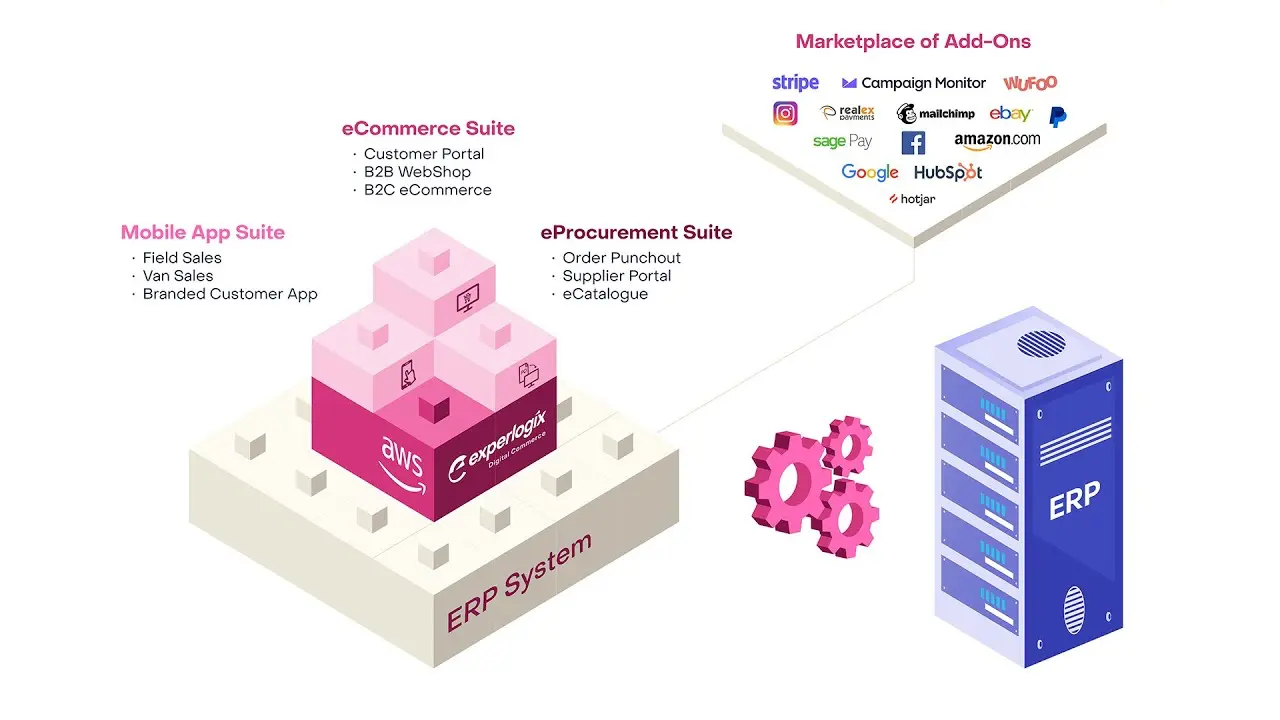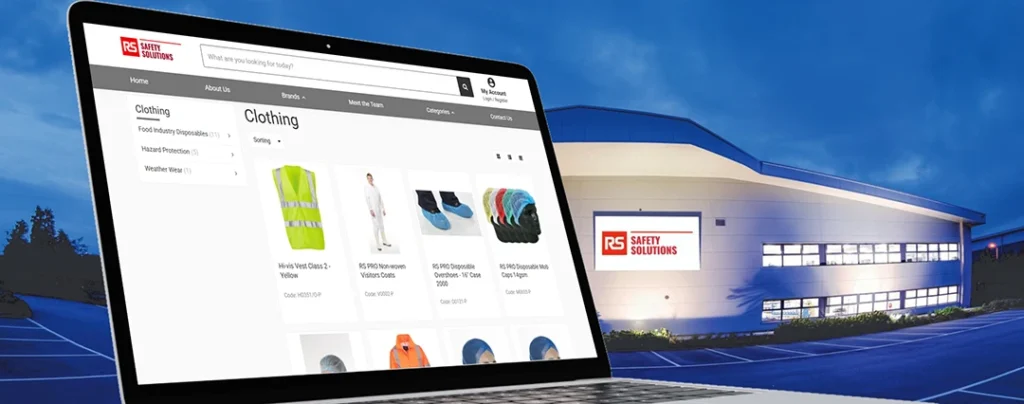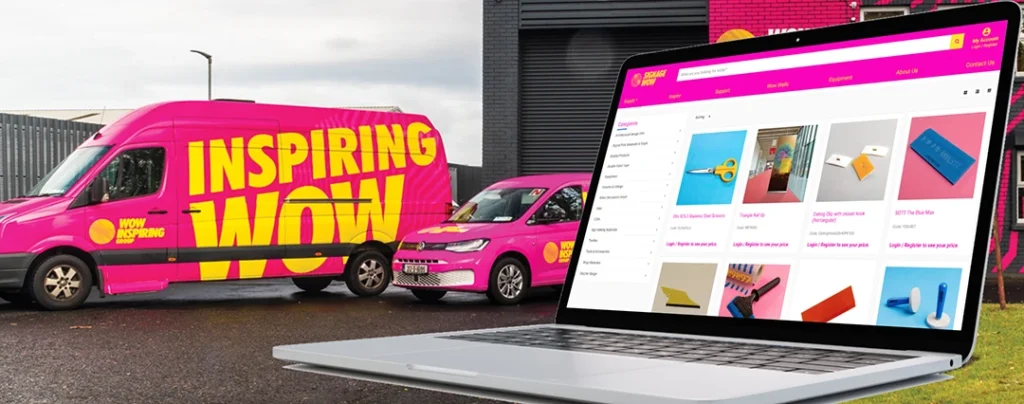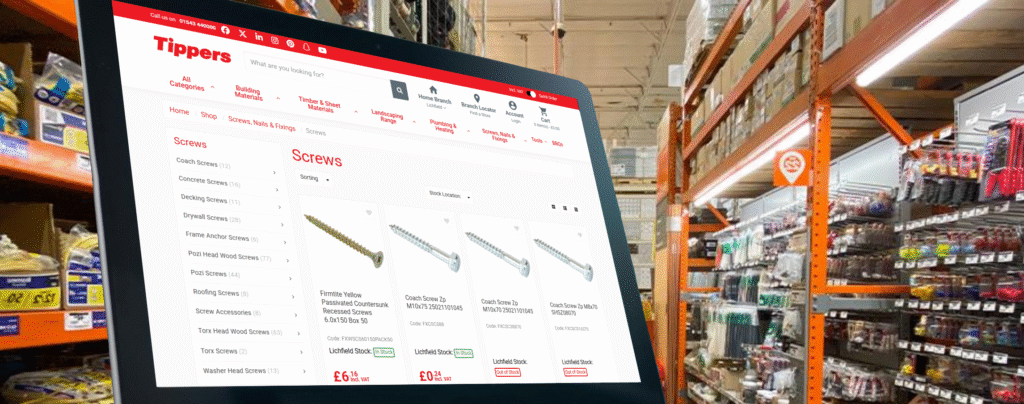With even more of our lives moving online, commerce is changing fast. Digital commerce is rapidly becoming a must-have for B2B and B2C organizations alike, and investment in these solutions continues to shape how businesses operate. According to a Forrester report, B2B digital commerce is projected to reach significant figures by the next year, emphasizing its importance in the modern business landscape.
In simple terms, digital commerce means buying and selling things using digital platforms. It’s not just about buying something online. It’s about the entire process: browsing online, getting recommendations, and making purchases on a marketplace.
Let’s look at Experlogix Digital Commerce as an example. It’s a cloud platform designed for many areas like business-to-business (B2B), business-to-consumer (B2C), and even consumer-to-business (C2B).
Partnering with big names like SAP, Brightpearl, and Microsoft Dynamics 365 ERPs, Experlogix gives users up-to-date info on products. This makes buying easier for customers, anytime and anywhere.
Digital commerce, often referred to as D-commerce, involves the electronic buying and selling of goods and services on digital platforms, encompassing a range of activities from online shopping to electronic payments.

Top 8 Things to Know About Digital Commerce
- Digital Commerce Basics: It’s a way to buy and sell things online. But it’s more than just purchasing. It’s the entire journey from browsing to buying, all done on digital devices.
- How It Works: Digital commerce uses advanced tech to enhance the shopping experience. For example, when you shop online, the system might recommend the items you see based on what other shoppers liked.
- Digital vs E-commerce: E-commerce is mostly shopping on websites. Digital commerce goes beyond to include other sales types like B2B, C2B, and C2C. It embraces many tools and channels, from mobile shopping to social media buying.
- Key Features:
- It provides a digital self-service experience for shoppers.
- Incorporates tech for content, promotions, pricing, and customer care.
- Manages vast amounts of data, ensuring optimal user experience.
- Encompasses the entire buyer’s journey across both online and offline spaces.
- Examples: You’ll find online stores, digital marketplaces, AR shopping experiences, AI-driven recommendations, and subscription services.
- Pros for Businesses: Digital commerce reduces costs. No need for a physical store means fewer overheads. Plus, the online presence means being open 24/7, offering utmost convenience to shoppers.
- Adaptable Strategy: Successful digital commerce platforms use modern tech and keep adapting. They’re flexible, changing with what shoppers want, ensuring a delightful experience.
- Continuous Growth: As tech gets better, so does digital commerce. With things like AI, AR, and other innovations, the future of shopping online is full of potential growth opportunities and ways to drive even more customer engagement.
Digital Commerce vs. E-commerce: Understanding the Key Differences in Online Shopping
E-commerce is mostly about buying and selling on an online store or website. When you buy something online or look at online shops, that’s e-commerce. But digital commerce is more wide-ranging. It includes not just B2C, but also C2C, B2B, and C2B sales.
What sets them apart? It’s the range of processes and tech used. Digital commerce brings in things like shopping via mobile, buying through social media, trying things out using augmented reality, and more.
How does digital commerce differ from e-commerce?
While e-commerce primarily focuses on online transactions for buying and selling goods, digital commerce offers a broader perspective, including mobile commerce, social commerce, and other online commercial activities.
While both involve online transactions, digital commerce encompasses a broader spectrum. As noted by Harvard Business Review, digital commerce includes aspects like mobile commerce, social commerce, and more, offering a more holistic approach compared to traditional e-commerce.
And it uses different channels to make these happen.
Digital Commerce: Distinguishing It from Traditional E-commerce Practices
Think of being on a shopping website. What you see, the order items appear, and the suggestions made to you are all decided by complex computer calculations. These systems learn from what customers do and like to improve their shopping experience . From someone looking at an item to checking its reviews, all this info helps fine-tune future suggestions and strategies.
So, it isn’t just about buying. It’s about the whole experience from finding an item to buying it.
The Role of Digital Commerce Platforms
Beyond facilitating online sales, d-commerce platforms serve as the backbone, enabling businesses to implement the strategies highlighted above. They offer a myriad of features, ensuring a memorable and engaging customer journey.
Embarking on Your Digital Commerce Journey
As businesses look to dive into digital commerce, they should:
- Define Comprehensive KPIs: Go beyond just tracking conversions. Understand your customers’ behavior in-depth.
- Prioritize Content Measurement: Gauge the efficacy of your content. What are consumers reading? What’s making an impact?
- Start Small, Dream Big: Perfection is a journey. Begin with small steps, learn, adapt, and then scale.
New Moves in Digital Commerce
Tailored Shopping: Using tools like online trackers, companies can give customers a shopping experience that’s just for them. They see what users like and suggest items based on what they’ve looked at and bought before.
Augmented Reality (AR) in Shopping: Buying online isn’t just about pictures now. With AR, customers can try on clothes or see how furniture looks in their room before purchasing.
How are technologies like AI and AR shaping digital commerce?
AI enhances personalized shopping experiences by analyzing user behavior, while AR offers immersive product previews, revolutionizing the online shopping experience.
Smart Stock Management: Handling stock well is a big win for companies. Modern tools help businesses keep an eye on their stock, making sure they have just what they need.
Unified Marketing: Companies need to maintain consistent branding across all platforms. This includes apps, websites, and social media. Customers interact with multiple channels, so it is important for companies to ensure a unified marketing approach.
Making Things Easier with Automation: Automating routine tasks means businesses can spend more time improving the shopping experience, drawing insights from their data and engaging with their customers.
To wrap it up, digital commerce takes what e-commerce does and pushes it further. D-commerce’s role in shaping global business cannot be understated.
A Statista report predicts that by 2025, nearly 30% of all retail sales will be through d-commerce platforms.
By using the latest tech, companies can give customers a smoother shopping journey. In today’s digital-first world, getting to grips with digital commerce is key for businesses looking to succeed.












